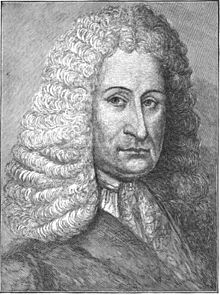Elisha Cooke
Elisha Cooke (born September 16, 1637 in Boston , Massachusetts Bay Colony , † October 31, 1715 , ibid) was a doctor, politician and businessman who was a speaker in the House of Representatives of Massachusetts in 1683 . He was the leader of the Popular Party , a parliamentary group in the House of Representatives that opposed interference by royal officials on the colonial rights embodied in the Massachusetts Charter.
Life
Cooke was born on September 16, 1637 to the tailor Richard Cooke and his wife Elizabeth Cooke. Richard and Elizabeth Cooke were from Gloucestershire . He was baptized on November 5, 1637. He studied at Harvard University , where he graduated in 1657 in a class with six other students. In the ranking of the class he was in 5th place, which meant that he came from an insignificant family. Then he settled as a doctor in Boston. He was also politically active and became Freeman in 1673.
Elisha Cooke married Elizabeth Leverett, daughter of John Leverett, in 1668 . Through this marriage he gained political and social importance. With her he had a son Elisha Cooke Jr. who was also active in colonial politics.
As a representative for Boston he was elected to the colonial assembly in 1681. He was in a leading position among those who spoke out against sending agents to England to negotiate trade agreements. The colonial administration was increasingly the focus of Charles II from the beginning of the 1660s, and it came under serious pressure from the late 1670s. Edward Randolph, who was sent to New England in 1676 to collect taxes and enforce navigational files, documented a number of incidents and problems and presented them to the Board of Trade in London. He was a member of the assembly until 1683, in that year also as speaker of the house. He was a retainer of Joseph Dudley in 1884, 1885, and 1886 . However, when Dudley was named New England Council President in 1886, Cooke ended his allegiance. In May 1693 he was elected to the council of advisors, but Governor William Phips refused to ratify the election because Cooke refused to be appointed commander in chief. In 1694 he was re-elected and since Phips was recalled to England, he took office. He was appointed judge of the Massachusetts Supreme Judicial Court in 1965, replacing John Richards , who had previously died. In 1701 he succeeded William Stoughton as Judge of Probate .
Cooke was confidential advisor to Richard Coote the Earl of Bellomont and colonial governor of the Province of Massachusetts Bay , the Province of New Hampshire and the Province of New York . He had met Coote in New York when he was on his way to Massachusetts to take office. Cooke had an intensive correspondence with Coote.
Since Cooke was a member of the board that put Dudley in jail for three months in 1689, Dudley hated him and when he was appointed governor in 1702, Dudley stripped him of the judge's office. Cooke was always in opposition to the incumbent governors, but he had a particular hostility with Dudley, which was manifested in many speeches by both Cooke and Dudley. It was not until 1715 that an approach took place. In the May elections, Dudley did not opportune against Cooke, he was elected, but died in October of that year.
Individual evidence
- ^ A b c Biographical Sketches of Graduates of Harvard University: In Cambridge, Massachusetts . Massachusetts Historical Society, 1873, p. 520 ( books.google.de ).
- ↑ a b c d The American Jurist and Law Magazine . Freeman & Bolles, Jan. 1, 1843, pp. 142 ( books.google.de ).
- ^ Puritan Boston and Quaker Philadelphia . Transaction Publishers, 1996, ISBN 978-1-4128-3257-1 , pp. 146 ( books.google.de ).
| personal data | |
|---|---|
| SURNAME | Cooke, Elisha |
| BRIEF DESCRIPTION | Doctor and politician |
| DATE OF BIRTH | September 16, 1637 |
| PLACE OF BIRTH | Boston |
| DATE OF DEATH | October 31, 1715 |
| Place of death | Boston |
